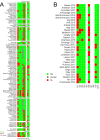The use of precision diagnostics for monogenic diabetes: a systematic review and expert opinion
- PMID: 37794142
- PMCID: PMC10550998
- DOI: 10.1038/s43856-023-00369-8
The use of precision diagnostics for monogenic diabetes: a systematic review and expert opinion
Abstract
Background: Monogenic diabetes presents opportunities for precision medicine but is underdiagnosed. This review systematically assessed the evidence for (1) clinical criteria and (2) methods for genetic testing for monogenic diabetes, summarized resources for (3) considering a gene or (4) variant as causal for monogenic diabetes, provided expert recommendations for (5) reporting of results; and reviewed (6) next steps after monogenic diabetes diagnosis and (7) challenges in precision medicine field.
Methods: Pubmed and Embase databases were searched (1990-2022) using inclusion/exclusion criteria for studies that sequenced one or more monogenic diabetes genes in at least 100 probands (Question 1), evaluated a non-obsolete genetic testing method to diagnose monogenic diabetes (Question 2). The risk of bias was assessed using the revised QUADAS-2 tool. Existing guidelines were summarized for questions 3-5, and review of studies for questions 6-7, supplemented by expert recommendations. Results were summarized in tables and informed recommendations for clinical practice.
Results: There are 100, 32, 36, and 14 studies included for questions 1, 2, 6, and 7 respectively. On this basis, four recommendations for who to test and five on how to test for monogenic diabetes are provided. Existing guidelines for variant curation and gene-disease validity curation are summarized. Reporting by gene names is recommended as an alternative to the term MODY. Key steps after making a genetic diagnosis and major gaps in our current knowledge are highlighted.
Conclusions: We provide a synthesis of current evidence and expert opinion on how to use precision diagnostics to identify individuals with monogenic diabetes.
Plain language summary
Some diabetes types, called monogenic diabetes, are caused by changes in a single gene. It is important to know who has this kind of diabetes because treatment can differ from that of other types of diabetes. Some treatments also work better than others for specific types, and some people can for example change from insulin injections to tablets. In addition, relatives can be offered a test to see if they are at risk. Genetic testing is needed to diagnose monogenic diabetes but is expensive, so it’s not possible to test every person with diabetes for it. We evaluated published research on who should be tested and what test to use. Based on this, we provide recommendations for doctors and health care providers on how to implement genetic testing for monogenic diabetes.
© 2023. Springer Nature Limited.
Conflict of interest statement
R.M. has received honoraria for consulting or educational activities for Eli Lilly, Novo Nordisk and Boeringer Ingelheim. S.M. has Investigator initiated funding from DexCom and serves on the Board of Trustees for the Diabetes Research & Wellness Foundation (UK). LK Billings: Received honoraria for consulting activities for Novo Nordisk, Bayer, Lilly, Xeris, and Sanofi which are unrelated to this present work. ALG’s spouse holds stock options in Roche and is an employee of Genentech. No other authors have competing interests.
Figures


References
-
- International Diabetes Federation IDF Diabetes eAtlas (International Diabetes Federation, 2022).
Grants and funding
LinkOut - more resources
Full Text Sources

